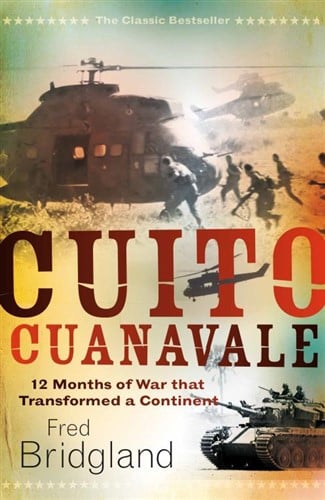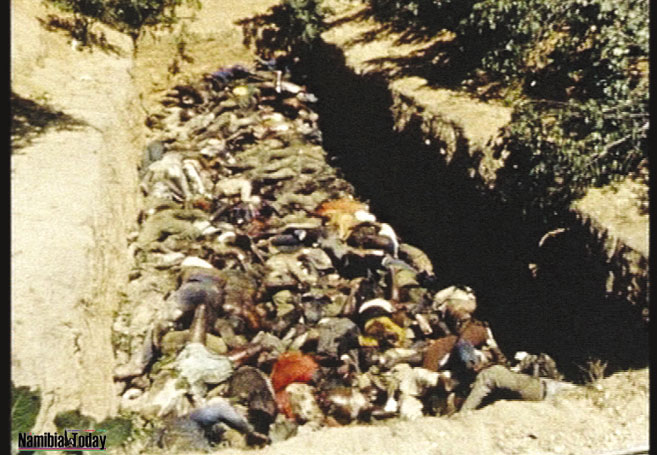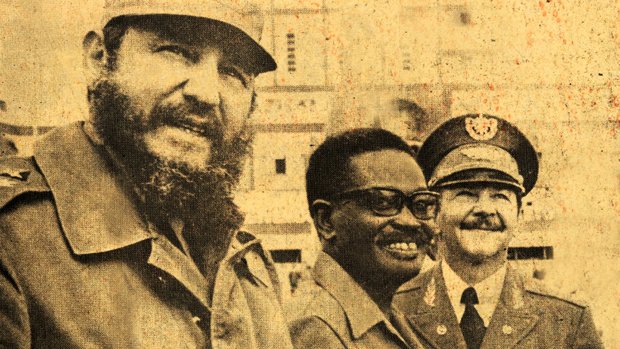The Cassinga to CuitoCuanavale Commemorations. Landmark anniversaries highlight the historic role of the alliance between the people of Cuba and Africa

Two important commemorations related to the struggle for the liberation of Southern Africa and the culmination of the political phase of the independence movement on the continent, have been marked recently through acknowledgements of the 40th year since the massacre of Namibian refugees at Cassinga in 1978 and a decade later when the combined military forces of Angola and Cuba decisively defeated the racist apartheid South African Defense Forces (SADF) in April 1988 at CuitoCuanavale.
Although the independence of the Republic of Angola had been secured in late 1975 and early 1976 after a monumental battle to consolidate the authority of the Popular Movement for the Liberation of Angola (MPLA), the SADF had continued to make incursions into the southern region of the former Portuguese colony through its direct intervention as well as the United States and the apartheid racist regime’s support for the Union for the Total Independence of Angola (UNITA). The appeal by MPLA leader and first president of Angola, Dr. Agostino Neto, to the government of Cuban President Fidel Castro for military assistance, resulted in the defeat of both National Front for the Liberation of Angola (FNLA), UNITA and the SADF by early 1976.
On April 19, 2018, the National Assembly of the Republic of Cuba voted overwhelmingly for a new leader of government President Miguel Diaz-Canal Bermudez. General Raul Castro, the former president, will remain on as Secretary General of the Cuban Communist Party (PCC) for several more years to come. These events in Cuba represent the passing of the torch of Socialist construction and internationalism which was a key motivating element in the answering of the call by Dr. Neto for assistance leading to the formal recognition within the Organization of African Unity (OAU) and the United Nations of the MPLA administration.
Fidel pointed out in 1975 that Cubans are a “Latin African people committed to the eradication of the colonialism, racism and imperialism.” Consequently, there was historical and political justification for their intervention in Angola which resulted by 1988-89 in a framework which led to the liberation of Namibia and the eventual defeat of the apartheid system in the Republic of South Africa.
Cuba has maintained its solidarity with the African Revolution over the course of the last three decades. Thousands of Cuban healthcare workers, technicians and military advisors have provided support to OAU and now African Union (AU) member-states.
One of the last diplomatic initiatives carried out by President Raul Castro as head-of-state was a meeting with the Angolan Minister of Defense on April 13. According to Gramma International, the official newspaper of the PCC, its says of the engagement that:
“President of the Councils of State and Ministers, Army General Raúl Castro Ruz, yesterday afternoon, received Angola’s Minister of National Defense, Salviano de JesúsSequeira, who is making an official visit to Cuba, on the invitation of the Ministry of the Revolutionary Armed Forces. During the fraternal meeting, the two leaders emphasized the excellent relations shared by their countries; the historic, collaborative ties that unite the two peoples, governments, and armed forces; as well as their desire to further strengthen the relationship.”
During the Ebola Virus Disease (EVD) pandemic of 2013-2014, the Cuban government deployed hundreds of healthcare personnel to assist in the elimination of the disease which had killed over ten thousand people mainly in Guinea, Sierra Leone and Liberia. Cuba’s role in addressing the EVD crisis was so profound that it had to be commended by the U.S. imperialists themselves who mainly responded with military personnel of the Africa Command (AFRICOM).
Cassinga Massacre Exposed the Genocidal Nature of Apartheid Colonialism
May 4, 1978 has gone down in the annals of history as a tragic day for the people of Angola and Namibia. The SADF utilizing its Airforce (SAF) bombed the Namibian refugee camp at Cassinga in Angola killing over 600 women, men and children.
The apartheid regime has said that Cassinga was a military base for the SWAPO armed combatants, the People’s Liberation Army of Namibia (PLAN). Yet photographs published of the event showed mass graves of hundreds of civilians slaughtered by the SADF.
Cassinga massacre on May 4, 1978 in Angola
Once the area had been bombed by the SAA, a commando unit of SADF troops landed in order to ensure the killing of even more inhabitants of the camps. Although the landing of troops by the apartheid military forces was said to be aimed at the capture or killing of leading PLAN officers, there was never any documented proof that this actually occurred.
After the Cassinga massacre, the movement for the liberation of Namibia accelerated. Sam Nujoma, the former leader of SWAPO and the first president of the independent state formerly known as South West Africa, was invited to address the United Nations. Material aid to SWAPO increased measurably while the apartheid government of the-then President John Vorster was roundly condemned throughout Africa and the world.
Later that year in September 1978, United Nations Security Council Resolution 435 was adopted creating the legal basis for the withdrawal of SADF troops from Namibia and the independence of the apartheid colony. This same resolution also created a United Nations Transition Assistance Group designed to be empowered for a period of one year to ensure the realization of independence for Namibia through free elections under the supervision and control of the United Nations.
Every year the anniversary is commemorated as Cassinga Day. This year on the 40th anniversary a ceremony was planned in Namibia involving the current President of Angola João Manuel GonçalvesLourenço.
CuitoCunavale: The Decisive Battle for Liberation
Ten years after the Cassinga massacre the SADF experienced its most stunning defeat in a series of clashes centered-around the Angolan municipality of CuitoCuanavale. The combined units of the Angolan Armed Forces (FAPLA), PLAN and Um Khonto we Sizwe (MK), the military wing of the African National Congress (ANC), fought battles with the SADF.
The retreat of the SADF units and their strategic shift resulted in compromises within the apartheid state under then President P.W. Botha. Negotiations intensified during the course of 1988 leading to a tentative agreement by the end of the year.
All parties to the negotiations including the apartheid regime, the U.S. as mediator, the Soviet Union as observers, Angola and Cuba agreed upon the establishment of a Joint Monitoring Commission known as the Brazzaville Protocol. The agreement was to allow SWAPO cadres to enter Namibia beginning on April 1, 1989.
This agreement was betrayed by the apartheid forces which attacked members of PLAN leading to clashes resulting in the deaths of several hundred Namibians. Additional discussions were able to salvage the independence process leading to preparation for elections later in the year.
South Africa’s apartheid government agreed to withdraw from Angola and Namibia in order for internationally-supervised elections to be held in Namibia in November 1989. Cuban internationalist units also withdrew from Angola as part of the agreement. Over the period of 1975 to 1989, over three hundred thousand Cubans served in a voluntary capacity in Angola playing an indispensable role in the process of national liberation in the sub-continent.
Namibia declared its independence on March 21, 1990. Meanwhile, the racist regime under anotherPresident F.W. DeKlerk, unbanned the ANC, the South African Communist Party (SACP) and other organizations on February 2. Nelson Mandela was released from prison on February 11 opening the way for negotiations on the transferal of power which occurred four years later in May 1994.
Southern Africa,
Of course the independence of the colonized states throughout Southern Africa was an enormous accomplishment stemming from a series of political, labor, popular and military struggles which extended from the mid-1970s to 1994. The degree of cooperation between Socialist Cuba, the Angolan government, SWAPO and the ANC qualifies as a milestone in contemporary world affairs.
Cuba Presidents Fidel and Raul Castro with Angolan President Dr. Agostino Neto
Today even though the political liberation of Southern Africa is a reality, the threat of imperialist recolonization is still present. The neo-colonialist phase of African history is manifested in the ongoing economic dependency on the transnational corporations principally international finance capital.
Namibia, Angola and South Africa are extremely rich in mineral, energy and agricultural resources. Nonetheless, with specific regard to Angola and South Africa, these states have been undergoing economic difficulties due to the decline in commodity prices utilized to generate western foreign currencies which have created a renewed debt crisis.
Angola is one of two leading producers and exporters of oil from the African continent. Several years ago foreign investment was pouring into the country resulting in phenomenal annual growth rates of its Gross Domestic Product (GDP).
However, a recent report on the situation inside the country noted:
“Angola is trying to renegotiate its foreign debt, which at the end of last year reached 62.8% of Gross Domestic Product (GDP), the Secretary of State for Economy and Planning, Neto Costa said in Washington, according to the Voice of America. Neto Costa told a conference of potential investors organized by the World Bank and the United States Angola Chamber of Commerce that the ratio of debt service to tax revenues was 89.4% at the end of last year, and Jornal de Angola reported that more recent figures showed that Angola’s debt may have already reached 67% of GDP.” (Macauhub, April 20)
Of course between the 1960s and the 1990s, the International Monetary Fund (IMF) and the World Bank was instrumental in the consolidation of neo-colonialism in Africa through a process which became known as structural adjustment. These financial institutions which were a by-product of the Bretton Woods monetary system imposed by the U.S. during the post-World War II period for Europe became a mechanism for controlling and containing development projections for independent states in Africa and other regions within the so-called Global South.
The same above-mentioned article goes on to emphasize:
“The Angolan government announced this week it had requested the support of the IMF, but limited to the coordination of economic policies to assist in ‘implementing the government’s program of macro-economic stabilization.’ The newspaper also quoted Neto Costa as saying that Angola’s foreign exchange reserves have been falling since 2013, when they were valued at about US$31 billion, to just over US$13 billion last year. The governor of the National Bank of Angola told the conference that Angola needs to diversify its economy, as 95% of its resources come from oil sales and the country spends US$250 million per month to import food, for example.”
These same issues are not confined to Angola and the Southern Africa region. During late March there was the formation of an African Continental Free Trade Area (AfCFTA) in Kigali, Rwanda. The concept for AfCFTA has its genesis within the ideas of the Republic of Ghana’s First Prime Minister and President Dr. Kwame Nkrumah dating back to the 1950s and 1960s.
In a general sense the program is pointing in the direction of economic integration through a single African-centered monetary system, continental trade regulations and joint agro-industrial projects. Despite these noble intentions some states are forced to consider their relationships with imperialists who are the main sources of investment, loans, imports and exports.
Taking these factors into consideration the crises of modern African development imperatives become more of a political question. Are the independent state prepared to break with the imperialist mode of production and exchange? If not then which economic model will be conducive to genuine growth and progress on the continent?
Centralized planning is of utmost importance along with the integration of state entities. The popular forces represented by the workers, farmers and youth must be brought to the leadership of the productive and decision-making process to unleash the capacity of the masses, which is a prerequisite to turning the corner towards sovereignty, Socialist planning and Revolutionary Pan-Africanism in the form of an All-African Union Government.
The sustainability of Socialism in Cuba and the People’s Republic of China could serve as a model for the AU member-states. Both of these non-capitalist states have proven their willingness to work in solidarity with the African Revolution.
*
Abayomi Azikiwe is the editor of Pan-African News Wire. He is a frequent contributor to Global Research.
All images in this article are from the author.
The original source of this article is Global Research
Copyright © Abayomi Azikiwe, Global Research, 2018















